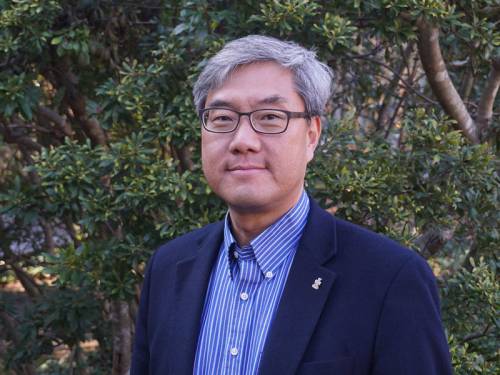Lectionary preview for November 18 focuses on Hebrews 10
By Kevin Park | Presbyterian Foundation communications
The second reading for Sunday, November 18, is Hebrews 10:11-14, (15-18), 19-25.

Dr. Kevin Park Courtesy of the Presbyterian Foundation
How do you preach stewardship to a congregation that’s about to leave the church? In a nutshell, that’s what the writer of Hebrews is trying to do. Hebrews is a long way from the initial excitement, enthusiasm, and the explosive birth and growth of the church recorded in the first chapters of Acts.
By the time the Letter to the Hebrews was written, Christians had gone through enough persecutions and hardships that they were ready to throw in the towel and leave the church. The writer of Hebrews entreats the faith community to stay, and teaches that Jesus is the one messiah through whom they are redeemed. The writer uses every biblical, pedagogical, rhetorical, homiletical and admonitory resources available to persuade, plead and challenge the community to hold onto the faith and live out the new life promised in Christ.
A good example of this can be seen in Hebrews 10:23-25, which is part of the lectionary for November 18.
23 Let us hold fast to the confession of our hope without wavering, for he who has promised is faithful.
24 And let us consider how to provoke one another to love and good deeds,
25 not neglecting to meet together, as is the habit of some, but encouraging one another, and all the more as you see the Day approaching.
In a series of first-person imperatives, the writer beseeches the congregation to love and encourage one another as expressions of holding onto the promises of Christ. But this is no sentimental feel good love message. The writer uses the word “provoke” to describe how the community ought to move toward love and good deeds. The word in Greek is paroxusmos from which we get the word paroxysm. It means to stimulate, provoke, irritate, jab; words not normally associated with love and good deeds. Moving toward love and good deeds is so important for a community of faith that Christians must risk offending each other in the hope of engendering these essential qualities.
I was raised in a modest immigrant family with devout Christian parents. I remember a particular Sunday morning when I was a teenager. Everyone was getting ready for church. My mother was sitting by her dressing table carefully putting crisp cash bills in several envelopes and carefully labeling them. I asked what she was doing, and she cheerfully explained to me that she was preparing offering for worship. She showed me each envelope, five of them in total, with specific designations: one for regular offering, one for the tithe, one for missions giving, one for the church building fund. The fifth envelope was for a special thanksgiving offering, she said, for my father’s birthday that week.
I felt irritated, being certain that I had just witnessed a clear case of fiscal recklessness. We could have used some of that money for our own needs! But before I could say anything, my mother beamed and exclaimed with pure joy.
“Isn’t it so wonderful that God has blessed our family so much?”
Her radiance was so sincere, genuine and robust, my cynicism simply evaporated against it. In fact, to this day, I look back to that provocative example of my mother’s stewardship, her joyful response to God’s faithfulness, blessing and promise, as a standard to which I try to measure up.
Let us, indeed, consider how to provoke one another to love and good deeds.
Dr. Kevin Park serves Associate Dean for Advanced Professional Studies, Assistant Professor of Theology, and Interim Director of Korean American Ministries at Columbia Theological Seminary in Decatur, Georgia. Dr. Park is interested in emerging Asian North American theologies and various expressions of theologies of the cross. His current research includes critiquing what he calls “Ornamental Multiculturalism,” and articulating a theology of divine beauty as a key theological resource for multicultural theology and ministry for the North American context. He holds a Ph.D. and Master of Theology from Princeton Theological Seminary and Master of Divinity from Knox College. He received a Bachelor of Arts degree from University of Toronto.
This article was reprinted with permission from the Presbyterian Foundation’s Stewardship Ministry blog.
![]() You may freely reuse and distribute this article in its entirety for non-commercial purposes in any medium. Please include author attribution, photography credits, and a link to the original article. This work is licensed under a Creative Commons Attribution-NonCommercial-NoDeratives 4.0 International License.
You may freely reuse and distribute this article in its entirety for non-commercial purposes in any medium. Please include author attribution, photography credits, and a link to the original article. This work is licensed under a Creative Commons Attribution-NonCommercial-NoDeratives 4.0 International License.